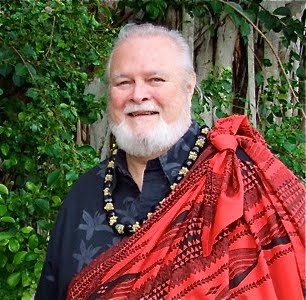Koani Foundation Director Kai`opua Fyfe In Feature Story
For Kaua`i - March 7, 2011
When Lihu`e resident Kai`opua Fyfe suits up mainland style and heads to the United Nations in Geneva or its New York Headquarters, he has a solid two weeks of nearly 24/7 work to look forward to. Once there, he plunges into established alliances with UN member states of the Permanent Forum on Indigenous Issues to keep the issue of Native Hawaiian sovereignty in full view of the world’s nations.
Because Hawai`i is not a member nation of the UN, it is imperative for Fyfe to maintain those alliances through which he is able to give voice to the kanakamaoli of Hawai`i (native Hawaiians). And that takes time.
“It’s four to six commitments a year — but preparation is constant,” he says.
In this effort, Fyfe is operating on behalf of the Koani Foundation, founded by John “Butch” Kekahu III of Anahola. Prior to his death in late 2001, Kekahu appointed Fyfe a director of the foundation.
The Foundation is an unfunded gathering of dedicated Kanaka Hawai`i Maoli and multi-ethnic supporters originally enlisted by Kekahu to promote unity through education and capacity building. Its mission is to achieve a free Hawai`i through education and unification of the people.
Describing what it means to have a free Hawai`i, Fyfe says, “I think very broadly, it has to be a Hawai`i that makes its own choice — we weren’t given a choice.”
Steps taken thus far with the UN may seem small, but, says Fyfe, “We look for our successes in little bites, little victories. For example, experts from various member states present our questions for us when the opportunity arises since we’re not a member state of the UN.”
The questions go on record, and have to do with the overthrow of the Hawaiian kingdom and how the United States has misused its commitments through the United Nations, says Fyfe.
“Within various committees, we have increased awareness of our issues and have some international support — and we can claim some degree of credit for being able to stall the native Hawaiian Akaka Bill that [Sens.] Inouye and Akaka have tried getting through the U.S. Congress for the past several years.”
Fyfe adds that there’s a lot more to the work of promoting sovereignty than maintaining those alliances at the UN, and there are many persons outside of Koani Foundation working with Koani on various fronts.
Says Fyfe, “We sponsored Keao Nesmith, a young man with Kaua`i roots, an academic and accomplished educator who’s finishing his doctorate degree, to do some UN training in Australia on peace building. They were enamored of him.
“Malia Nobriga, also with Kaua`i roots, is a Pacific representative for environmental issues at the international level, also an educator, and she’s been involved for several years. She’s not a member of Koani, but we all collaborate.”
He continues, “We only have five directors and have a division of labor. We’ve worked with and been assisted by Miliani Trask, who has done a huge amount of work and is held in high esteem at the international level.”
Those who nix the possibility of a sovereign Hawai`i don’t shake Fyfe’s confidence it will happen.
“I think there will be resolution,” he says. “I think it’s a matter of timing.
“One thing we constantly remind ourselves is that resolution of the occupation of Hawai`i by the United States is a matter of time and preparation. If I didn’t have hope of resolving it, I would not be doing it — all you have to do is hear the factual history of what happened in Hawai`i.”
He continues, “It’s so easy to interest people in our history when they learn what it is — there’s no end of support. People respond from all over the world.
“There’s huge support out there, constantly building. I think it’s a matter of timing, getting ourselves in position and when the time arrives, we say ‘we’re there.’”
Fyfe became involved in the sovereignty movement after moving back to Hawai`i about 23 years ago and re-immersing himself in his culture. He says there are probably about 20 active groups, constantly evolving, that promote sovereignty.
“It isn’t that we all have hugely differing perspectives,” he says, “it’s usually about process and getting where we want to go, and with the increase in communication over the years, everyone’s become much more amicable. I think rough edges are coming off and communications have become much better.”
According to Fyfe, the future looks good.
“We’ve got terrific young people coming up with terrific educations and who are really dedicated to Hawai`i and whatever it may become.”


Comments
Mahalo for all what you have done for the people of Hawaii. And yes, I agree the younger generation voices should have a platform to standon unlike our Na Kupuna and of course myself as part of the voices. I've had to learn how to do that..share my opinion and have the confidence to back it up.
We teach children to express themselves, however, education is not the place for our children to learn the way of the ancestors and their wisdom and love for their aina. Mahalo